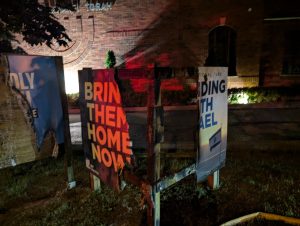When a projected 20 million Americans tune in to watch the Oscars telecast on Sunday March 10, one of the commercials is going to be a Canadian-made ad about antisemitism: with a team of Canadian actors including real-life clergy from Toronto starring in it.
The ad is part of a series commissioned by New England Patriots owner and billionaire philanthropist Robert Kraft, on behalf of his Foundation to Combat Antisemitism. The first one debuted during the Super Bowl, and showed a former speech writer for Dr. Martin Luther King.
This new Canadian-made commercial was supposed to air then, but was not chosen partly because the Super Bowl slot was only 30 seconds, while the “Neighbours” ad runs 60 seconds. It depicts a slightly modified version of the bomb scare at Congregation Agudas Achim, a Reconstructionist synagogue in Attleboro, Mass., during Shabbat services on Oct. 14. It was just a week after the Hamas attack on Israel that killed 1,200 people—and the day after Hamas leaders urged a worldwide day of action against Jewish targets.
The American synagogue planned to host a bat mitzvah that morning, until a threatening email arrived. The building was evacuated and placed off-limits while police checked the premises.
As the investigation was underway, anxious attendees gathered in the parking lot of the Evangelical Covenant Church across the road. The marooned Jews were invited inside, where the pastor encouraged them to hold their interrupted services until they got the all-clear to return to Agudas Achim.
Filmed in Hollywood North
While the inspiring incident of fellowship and solidarity took place south of the border, the spot was filmed this Jan. 17 in Toronto, at the century-old Kiever Synagogue. And the local cast included two Jewish clergy: rabbis Michael Dolgin and Aviva Rajsky.
Rabbi Rajsky, the cantor at Toronto’s Congregation Habonim, had her first brush with on screen fame in 2019 when she sang the national anthems at a Toronto Raptors game.
But local commercial director Jon Weiman and his family are members of her congregation Habonim, and it was the shul’s spiritual director Eli Rubenstein who sent the casting agency some clips of Rabbi Rajsky singing for the High Holidays.
“It’s been Aviva’s dream since she was a child to play the Super Bowl,” joked Rubenstein, who knows the cantor’s presence in the commercial is more meaningful due to her being the daughter of a Holocaust survivor. The cast and crew were originally told this ad would play during the Super Bowl on Feb. 11. Rasky has also joined Rubenstein on March of the Living trips to Auschwitz and Israel.
Robert Kraft has been involved in similar pilgrimages. Last year, he led a March of the Living, accompanied by rapper Meek Mill. Kraft also regularly takes NFL players to the Jewish state as part of his program, Touchdown in Israel.
“The message is a beautiful message, not just standing up against Jewish hate, but against all intolerance,” said Rabbi Rajsky. “I loved that the message was conveyed not with a hammer over the head, but organically.”
When fiction mirrors reality
Nonetheless, the Attleboro synagogue bomb scare story was altered slightly for the script. Rather than a bat mitzvah in the morning, it depicts a bar mitzvah ceremony occurring after dark—and while the rabbi in the real-life situation was a woman, the spot features Rabbi Michael Dolgin of Toronto’s Temple Sinai.
The role was designed with him in mind, because he conducted Jon Weiman’s bar mitzvah nearly 25 years ago.
Still, getting the part required an audition. Rabbi Dolgin submitted photos of himself wearing several different ties and different prayer shawls from his personal collection.
“I didn’t have an identity crisis, because I got the part of ‘Me’.”

All kidding aside, the rabbi was further motivated by the fact that Temple Sinai neighbours the Highway 401 overpass at Avenue Road, where war-related protests have continued to disrupt the largely Jewish neighbourhood, even after Toronto police announced they were prohibited at this location.
Also, one of his synagogue’s former members, Judih Weinstein Haggai, was murdered by Hamas terrorists, along with her husband Gadi, on Oct. 7, while they were out for a hike near their home on Kibbutz Nir Oz. (Their bodies are still reportedly being held by Hamas in Gaza.)
But he also realizes he’s not unique in having to deal with such issues.
“Painfully, I can’t think of a rabbi who hasn’t thought about all these things,” said Rabbi Dolgin, who spoke to The CJN soon after he met with a police constable for a discussion about holding live-shooter drills at Temple Sinai.
Glimpses of vintage authenticity
Built in 1927, the Kiever is located on Bellevue Avenue in Kensington Market. The ornately intimate environment won out over the more modern uptown Toronto synagogues as a location for the first night of filming on Jan. 17.
And while the young Canadian teen who plays the bar mitzvah boy did chant part of a real Torah portion in Hebrew, with coaching from Rubenstein, the scroll they used had imperfections that prevent it from serving ritual purposes—which was done as not to violate any religious laws. (Torah readings for Shabbat don’t traditionally occur in the evening.)
According to Aviva Rajsky, it was the first time the Canadian teen playing the bar mitzvah boy had been cast in any creative production. But she felt he was certainly qualified to portray his role.
“He was just bar mitzvah-ed,” she said. “This kid knew how to leyn.”
The passage also wasn’t the one that would’ve been read last October, from the book of Genesis. Instead, the director picked lines from Leviticus, Chapter 19, in which God commands the Israelites to treat their neighbours as they would want themselves to be treated.
What a survivor inspired
Jon Weiman applied for the gig by incorporating into his pitch the lessons of tolerance and courage he learned from his late grandfather Ernie Weiss, who was a prominent Holocaust survivor and educator in Toronto. The legacy is also maintained by Weiman’s aunt, Marilyn Sinclair, who runs the Holocaust education organization Liberation 75 and the Ernie’s Books program, which donates material to Ontario elementary school students.
“Despite enduring unimaginable losses and suffering, his heart was filled with empathy and forgiveness,” Sinclair quotes from her nephew’s pitch. “This profound capacity for understanding, even after facing such harrowing experiences, was both baffling and inspiring to me.”
Weiman declined to be interviewed for the story due to non-disclosure rules, but it’s known that he also showed the ad agency a clip from his grandfather’s three-hour testimony filmed for Steven Spielberg’s Shoah Foundation, Sinclair said.
“My father didn’t speak very much to his children and grandchildren about his Holocaust experiences,” said Sinclair. “But on the day of Jon’s bar mitzvah, he suddenly announced in his speech that he had been deported to Auschwitz right before his own bar mitzvah. And that he had been liberated exactly 55 years ago to the day.
“No one could believe it. The room was silent—and then followed into thunderous applause.
“This was his moment of triumph over Hitler.”
A taste of Canadian winter
The first night of filming was done on a frigid January night with the temperature at -7 Celsius —which required outfitting the actors with glove warmers, shoe warmers and battery-powered shirts during the outdoor scene. The production relocated the next evening to the Humber Valley United Church in Etobicoke, a fair distance from Kensington Market.
“The bar mitzvah boy said, by the end, his least favourite word in English is ‘Reset’,” quipped Rabbi Dolgin.
Two weeks later, Rabbi Dolgin was summoned to a recording studio for dialogue overdubs, because the production needs to fit the shorter format. Overall, it was a reminder of how much work can be involved in producing 60 seconds designed for the global audience.
“Honestly, it was so obvious from the outset, the goal of this commercial was noble,” said Rabbi Rajsky. “As cool as it is to be in a commercial…we all feel like we’ve got to do something about the rise of antisemitism and how we combat it.”
For his part, Dolgin remains inspired by Weiman, his former bar mitzvah student-turned-commercial-director.
“The goal of such things is to affect or change hearts and minds and it’s really hard to know if we’ll be able to do that,” Rabbi Dolgin acknowledged. “But in one of our conversations, he said, ‘Even if we affect and change one heart and mind, then this will all have been worth it.'”
And, as it turns out, the spot has even more resonance even though the filming is complete.
On Monday, Jan. 29, a Massachusetts man was arrested and charged by U.S. federal authorities for making threats to the very same Congregation Agudas Achim in Attleboro whose October incident inspired the commercial produced in Toronto.
The caller’s message explicitly referenced bombing the synagogue and murdering Jewish children, as an act of revenge for “the f**king genocide” which the suspect blames Israel for, ever since war was declared on Hamas on Oct. 8.
Author

Ellin is a journalist and author who has worked for CTV News, CBC News, The Canadian Press and JazzFM. She authored the book Double Threat: Canadian Jews, the Military and WWII (2019) and contributed to Northern Lights: A Canadian Jewish History (2020). Currently a resident of Richmond Hill, Ont., she is a fan of Outlander, gardening, birdwatching and the Toronto Maple Leafs. Contact her at [email protected].
View all posts








